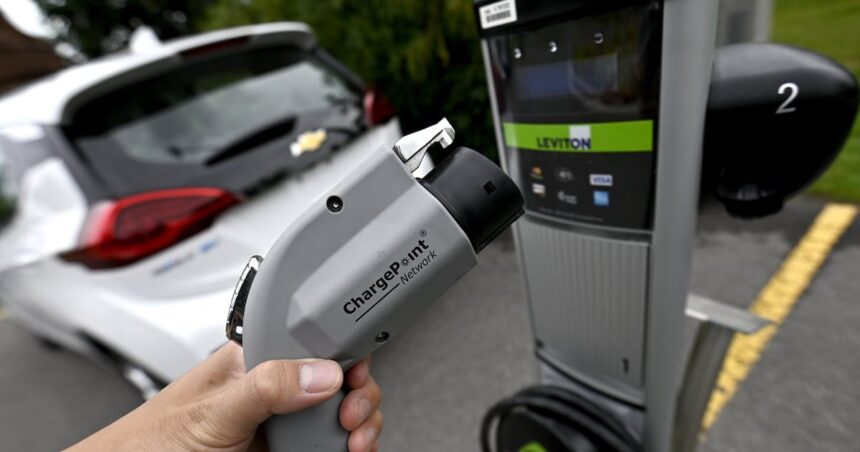The federal government is contemplating a new rebate program that would give consumers additional incentives to purchase electric vehicles manufactured in Canada, according to sources familiar with the discussions.
This potential initiative would exist alongside the current iZEV program, which offers up to $5,000 for Canadians buying or leasing eligible zero-emission vehicles regardless of their country of origin. The new made-in-Canada program would specifically target vehicles rolling off assembly lines in Ontario and other Canadian manufacturing facilities.
The move comes as Canadian automakers face increasing pressure from both American and Chinese competitors. South of the border, the U.S. Inflation Reduction Act offers Americans tax credits of up to $7,500 for North American-made EVs that meet strict battery sourcing requirements. Meanwhile, Chinese manufacturers continue to dominate the global EV market with lower-priced options.
“We’re in a global race for EV manufacturing jobs,” said Flavio Volpe, president of the Automotive Parts Manufacturers’ Association. “The Americans have used consumer incentives to drive industrial policy. Canada needs to recognize that consumer choices directly impact our manufacturing sector.”
Currently, Canada produces several EV models, including the Lexus RZ 450e and Toyota bZ4X in Cambridge, Ontario, and the Chrysler Pacifica Hybrid minivan in Windsor. The landscape is set to expand dramatically with major investments from Stellantis, GM, Honda, and others establishing EV and battery production facilities across Ontario.
Industry analysts suggest the made-in-Canada rebate could range from $3,000 to $5,000 per vehicle, effectively doubling the existing incentive for domestically produced models. This would bring Canada closer to matching American subsidies while potentially keeping more automotive jobs north of the border.
For consumers like Toronto resident Mikhail Barrows, who has been considering an EV purchase for months, the additional savings could tip the scales. “I’ve been weighing the options between a Tesla and some of the other models,” Barrows told me during a visit to a Toronto dealership. “If I could get a significant discount on something built by Canadian workers, that would definitely influence my decision.”
The Canadian auto sector employs approximately 125,000 people directly, with hundreds of thousands more in related industries. These numbers have declined from historical highs as production shifted to lower-cost jurisdictions over recent decades.
Statistics Canada data shows the automotive manufacturing industry contributed $12.5 billion to Canada’s GDP in 2022, making it a crucial economic sector, particularly in southern Ontario communities like Windsor, Oakville, and Oshawa.
The potential policy also raises questions about trade relations. While the Canada-United States-Mexico Agreement (CUSMA) allows certain automotive subsidies, there are limitations. Trade experts suggest a carefully crafted program could withstand potential challenges if structured as an environmental measure rather than a protectionist one.
“The key is ensuring the program doesn’t explicitly discriminate against imports in a way that violates our trade agreements,” explained Kristen Matthews, an international trade lawyer with Bennett Jones. “There are ways to support domestic production while remaining onside with our obligations.”
Environmental groups have offered mixed reactions. While supportive of accelerating EV adoption, some advocates worry about focusing too narrowly on vehicles rather than comprehensive transportation solutions.
“Electric vehicles are an important piece of the climate puzzle, but we need to think beyond car ownership,” said Clara Wilson from Climate Action Network Canada. “Any new program should include support for public transit, cycling infrastructure, and reducing the need for personal vehicles altogether.”
The timing of the announcement remains uncertain, though government sources indicate it could come before the next federal budget. The program would likely require parliamentary approval and could face opposition from parties concerned about the fiscal impact during a period of economic uncertainty.
Industry Minister François-Philippe Champagne declined to confirm specific details when asked about the program but acknowledged the government is “always looking at ways to support our automotive sector while accelerating the transition to zero-emission vehicles.”
For communities with automotive manufacturing facilities, the stakes are high. Thousands of jobs depend on ensuring Canadian plants secure mandates to produce next-generation vehicles rather than becoming obsolete as the industry transforms.
Windsor Mayor Drew Dilkens emphasized the importance of such initiatives for his community, where the automotive industry remains the largest employer. “These aren’t just jobs; they’re careers that support families and entire communities,” Dilkens said. “As we transition to electric vehicles, we need to ensure that transition includes Canadian workers.”
While details remain under wraps, the initiative reflects growing recognition that industrial policy and consumer incentives are increasingly intertwined in the global competition for manufacturing investment. With the auto industry undergoing its most significant transformation in a century, the government appears willing to use purchasing incentives as leverage to secure Canada’s place in the electric future.






